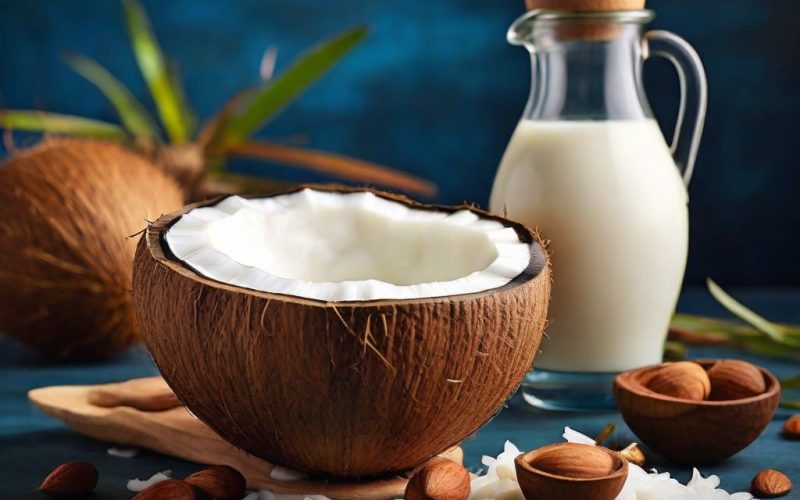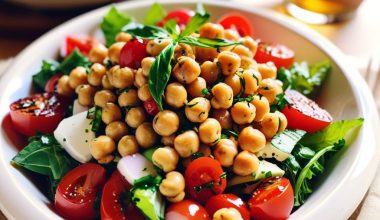Yes, you can have coconut milk on the Mediterranean diet. However, coconut milk should be consumed occasionally and in moderation, as it is high in saturated fat.
The Mediterranean diet is known for its focus on fresh fruits, vegetables, whole grains, legumes, nuts, seeds, and olive oil. It also includes moderate amounts of lean protein, such as fish and poultry, and limited amounts of dairy and red meat.
While coconut milk is not traditionally part of the Mediterranean diet, it can still be consumed in small quantities as a dairy alternative. It is important to note that coconut milk is high in saturated fat, so it should be enjoyed in moderation to maintain a balanced and healthy diet.
Exploring Coconut Milk On The Mediterranean Diet
Exploring Coconut Milk on the Mediterranean Diet reveals the adaptability of this cuisine to incorporate non-traditional ingredients like coconut milk, offering a dairy alternative option rich in flavor and versatility. Embracing coconut milk on the Mediterranean Diet adds a tropical twist while maintaining the diet’s health benefits and taste profile.
Introduction To The Mediterranean Diet
The Mediterranean diet is known for its emphasis on consuming fresh fruits, vegetables, whole grains, and healthy fats, such as olive oil and nuts. This diet is inspired by the traditional eating patterns of countries bordering the Mediterranean Sea, and it has gained popularity due to its numerous health benefits.
Traditional Dairy Options On The Mediterranean Diet
While the Mediterranean diet typically includes dairy products, individuals may seek alternatives like coconut milk due to dietary restrictions or preferences. The traditional dairy options on the Mediterranean diet include cow’s dairy, yogurt, and cheese. However, individuals are encouraged to moderate their consumption of dairy due to their calorie and fat content.
Understanding The Role Of Coconut Milk In The Mediterranean Diet

Coconut milk is not a traditional component of the Mediterranean diet due to its high saturated fat content. It’s advisable to consume dairy and dairy alternatives like almond or soy milk which are staples in this diet. It’s best to limit the intake of saturated fats and opt for healthier options.
Understanding the Role of Coconut Milk in the Mediterranean Diet Coconut milk has become increasingly popular in recent years due to its rich and creamy texture, as well as its unique flavor. However, when it comes to the Mediterranean diet, there has been some controversy surrounding the inclusion of coconut milk. In this article, we will explore the role of coconut milk in the Mediterranean diet and shed light on the saturated fat controversy as well as the debate over non-traditional ingredients.
Saturated Fat Controversy One of the main concerns surrounding coconut milk is its high saturated fat content. Saturated fats have been linked to an increased risk of heart disease and other health issues. In fact, coconut milk has one of the highest concentrations of saturated fat among all plant-based milks. However, it’s important to note that not all saturated fats are created equal. The saturated fats in coconut milk are primarily medium-chain triglycerides (MCTs), which are known to have different metabolic effects compared to long-chain triglycerides (LCTs) found in other sources of saturated fat.
Research suggests that MCTs may actually help boost metabolism and promote weight loss. They are also believed to have antimicrobial and antifungal properties, which can support gut health. However, more studies are needed to fully understand the effects of MCTs on overall health. The Debate Over Non-Traditional Ingredients Another aspect to consider when discussing coconut milk in the Mediterranean diet is the debate over non-traditional ingredients. The Mediterranean diet primarily emphasizes all type foods such as fruits, vegetables, whole grains, legumes, nuts, and olive oil. Traditional Mediterranean cuisine rarely includes coconut or coconut milk. Some argue that introducing non-traditional ingredients like coconut milk may dilute the authenticity of the diet and potentially lead to a less balanced approach.
On the other hand, others believe that embracing new ingredients can bring diversity and creativity to the Mediterranean diet, making it more accessible and appealing to a wider range of people. Ultimately, the decision to include coconut milk in your Mediterranean diet is a personal one.
If you enjoy coconut milk and find it adds value to your meals, you may choose to incorporate it in moderation. However, it is important to be mindful of your overall saturated fat intake and strive for a balanced and varied diet. In conclusion, while coconut milk is not a traditional ingredient in the Mediterranean diet, its inclusion can be a matter of personal preference. The saturated fat controversy and the debate over non-traditional ingredients are important factors to consider when deciding whether to include coconut milk in your Mediterranean diet. Remember to prioritize moderation and balance in your overall meal plan.
Can Coconut Milk Be A Viable Option On The Mediterranean Diet?
Maintaining a balanced and nutritious diet is essential for a healthy lifestyle. When following the Mediterranean diet, which is known for its emphasis on fruits, vegetables, whole grains, and lean proteins, it is important to understand what foods and beverages are considered compatible. One common question that arises is whether coconut milk can be a viable option on the Mediterranean diet.
Why Coconuts Were Not Historically Part Of The Diet
In order to understand the place of coconut milk in the Mediterranean diet, it’s important to consider the historical context. The Mediterranean region has not traditionally been associated with the consumption of coconuts. The indigenous plants and foods that flourish in this region, such as olives, nuts, and fish, have formed the foundation of the diet for centuries. Coconuts are not native to the Mediterranean and, therefore, were not historically part of the traditional diet.
Modern Interpretations And Flexibility In The Diet
While coconuts may not have been traditionally consumed in Mediterranean regions, modern interpretations of the diet have allowed for some flexibility. The Mediterranean diet is highly adaptable and allows individuals to incorporate foods and ingredients from other cultures, especially when they align with the principles of the diet. Coconut milk, although not traditionally consumed in the Mediterranean, can be a viable option for those looking for alternative milk choices.
Coconut milk, derived from the flesh of mature coconuts, is a rich and creamy milk alternative that is lactose-free and suitable for individuals with dairy allergies or lactose intolerance. It is also naturally free from cholesterol and has a distinct flavor that adds a tropical twist to recipes. However, it is important to note that coconut milk is high in saturated fat, so moderation is key.
When incorporating coconut milk into the Mediterranean diet, it is essential to strike a balance. While the diet promotes the consumption of healthy fats like olive oil, which has been shown to have numerous health benefits, it is important to limit saturated fat intake. This means using coconut milk sparingly and in moderation.
It’s also worth noting that coconut milk may not have the same nutritional profile as other Mediterranean diet staples. Unlike cow’s milk or almond milk, which are higher in protein, coconut milk is relatively low in protein. However, the Mediterranean diet is not solely centered around milk consumption, but rather focuses on the overall balance of the diet as a whole. As long as coconut milk is consumed in moderation and in conjunction with a variety of other nutrient-dense foods, it can be a viable option on the Mediterranean diet.
Balancing Nutritional Benefits And Concerns
As you navigate the Mediterranean diet, it’s essential to assess the nutritional benefits and potential concerns of including coconut milk in your dietary choices. Understanding how coconut milk compares with other dairy alternatives and being aware of its potential health impacts will help to make informed decisions.
Comparison With Other Dairy Alternatives
When considering dairy alternatives within the Mediterranean diet, it’s beneficial to compare coconut milk with other options. While coconut milk is lactose-free and suitable for those with dairy sensitivities, it contains higher saturated fat levels compared to almond or soy milk. However, it also provides a rich source of medium-chain triglycerides (MCTs), which can offer unique nutritional benefits. Here’s a simple comparison chart to highlight the differences:
| Dairy Alternatives | Saturated Fat Content | Nutritional Benefits |
|---|---|---|
| Coconut Milk | High | Source of MCTs |
| Almond Milk | Low | Rich in Vitamin E |
| Soy Milk | Low | Complete Protein Source |
Potential Health Impacts Of Coconut Milk Consumption
While coconut milk offers nutritional benefits, it’s important to be mindful of its potential health impacts. Due to its higher saturated fat content, excessive consumption of coconut milk may contribute to elevated cholesterol levels. However, when consumed in moderation, the MCTs in coconut milk can support healthy weight management and provide a quick source of energy for the body. Consider these factors when incorporating coconut milk into your Mediterranean diet, and prioritize portion control to achieve a balanced nutritional intake.
Integrating Coconut Milk Into Mediterranean Diet Recipes
When enhancing your Mediterranean diet, consider utilizing coconut milk in various recipes. This versatile ingredient offers a unique flavor profile and creamy texture.
Creative Uses In Traditional Dishes
- Add coconut milk to curries, stews, and soups for a tropical twist.
- Use it in smoothies, oatmeal, and chia pudding for a nutritious boost.
- Blend coconut milk into salad dressings and sauces for added richness.
Nutritional Tips And Substitutions
- Coconut milk can be a satisfying dairy alternative for those with lactose intolerance.
- Opt for unsweetened coconut milk to reduce added sugars in your diet.
- Substitute coconut milk for regular milk in recipes to add a tropical flair.
Frequently Asked Questions On Can You Have Coconut Milk On Mediterranean Diet
What Milk Can You Drink On Mediterranean Diet?
You can drink dairy on the Mediterranean diet, including cow’s milk and dairy alternatives such as almond milk or soy milk. However, it is advisable to limit your consumption of yogurt and cheese due to their high calorie and fat content.
What Is The Best Milk Alternative For The Mediterranean Diet?
The best milk alternative for the Mediterranean diet is unsweetened almond or soy milk. These dairy substitutes are suitable for those looking to cut down on their dairy consumption and align with the staples of the Mediterranean diet, which include nuts and legumes.
Is Coconut Oil Ok On The Mediterranean Diet?
Yes, coconut oil is acceptable on the Mediterranean diet. It’s high in saturated fat, so use it in moderation.
Is Coconut Sugar Allowed On The Mediterranean Diet?
Yes, coconut sugar is allowed on the Mediterranean diet but should be consumed in moderation.
Conclusion
Coconut milk can be enjoyed in moderation as part of a Mediterranean diet. While not traditionally native to the region, it can still be included as an occasional alternative to traditional dairy. Remember to balance your food choices and consider the overall caloric and nutrient content when incorporating coconut milk into your Mediterranean diet.







